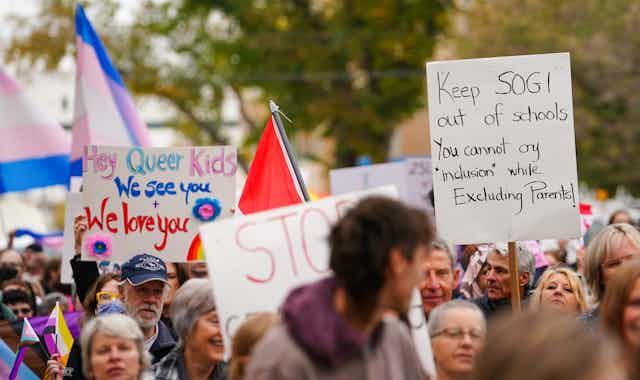Protests in support of “parental rights” have taken place across Canada in recent months. Many taking part in these demonstrations have railed against “gender ideology” in school curricula and mixed bathrooms.
Much of this rhetoric is based upon the transphobic fallacy that age-appropriate inclusive health education will somehow manufacture queer and trans children all over the place.
The rights of young people to determine their identities are being stripped away, beginning in New Brunswick and Saskatchewan. The rights of a trans and non-binary child or youth to be referred to by their name, and to be treated with respect by having their gender affirmed, are being eroded across Canada.
These policies put children and youth at risk, and they reinforce a false opposition between “parents’ rights” and children’s rights.
Pitting parents against their kids
Lacking support from family is one of the strongest predictors of trans and non-binary youth attempting suicide. Let that sink in. A trans kid’s family — their support, acceptance, dismissal or rejection — are the most important factor in whether a young person considers ending their life.
More than 10 years ago, researchers had already made strong connections between the support that trans youth received within their families and self-esteem, depression, suicidality, satisfaction with life and long-term overall mental health.
The term “dead name” is used to denote the pre-transition name of a trans or non-binary person. This term exists for a reason, because forcing a child to deny their gender identity can cause their mental health to suffer.

If parents, educators, schools and provincial governments really care about the health and well-being of our youth, we must oppose enacting policies that create a false dichotomy between the “rights” of parents and the rights of children and youth. We must instead help families of trans and non-binary youth to come together instead of be torn apart.
Respondents in research focused on minority stress and trans youth reported daily bullying in school and higher levels of sexual and physical assault, with poorer mental and physical health overall compared to non-trans participants.
Data indicates 59 per cent of transgender and non-binary people in Canada have reported being misgendered daily, an experience that can be devastating to a young person coming out into themselves.
Dangerous silencing
Silences can be dangerous. I didn’t even hear the word “lesbian” growing up in 1980s, conservative Canadian suburbs. In this shiny, white, middle-class Protestant world, silence about all forms of difference was a constant. But when I moved into the world I realized how our lives were veiled in layers of embedded racism, homophobia and compulsory heterosexuality.
To be clear, the silence and invisibility of lesbians, and even the invisibility of the word “lesbian” did not stop me from becoming a great big, card-carrying queer.
However, hearing the word at the right time might have stopped me from marrying a gay man at 19 and embarking upon a lavender marriage that was doomed from its inception. Silently and unconsciously we did what we “knew” to be the only road we could travel: we bought a house, we had babies, we spun through the tidal force of sanctioned heterosexuality and we still came out the other side flaming like rockets in the night, queers.
The invisibility we experienced and faced only made the road to authentic living and loving, much longer and harder, and it created so much more collateral damage. I tell this story because the way trans and non-binary youth are being repressed and made invisible today reminds me of the abyss of invisibility I faced.
So, when we pit the “rights” of parents against the rights of children and youth to have a safe, accepting and affirming family and school environment, we are assuming that these are in opposition.
Instead, we need to explore these questions through a systems lens. That is, we need to consider the whole: parents, siblings, the trans/non-binary youth, the school system, all of the systems in which the children or youth are swimming.

Overcoming transphobia with family support
There are situations where parents, teachers or others in a child’s life are irreconcilably transphobic, and this is not going to shift. However, in my extensive experience as a queer, gender non-conforming clinical psychologist, I have seen parents come around and find a way to affirm their child’s gender.
This was achieved through persistence, education and empathy. I had to make space for a parent’s fears, and even space for the transphobic comments and the concerns they produced (while shielding their children from those conversations).
The family must continue to show up, trying to find their way to their child. My job was to protect their child from their parents’ fear and transphobia while holding the parents as they tried to find their way. When this hard work by all parties was successful, the well-being of that child or youth was vastly improved and they finally had the support they needed to find their way through a frequently transphobic world.
I have also worked with families who could not overcome their views. A father who simply could not let go of rigid Catholic theological interpretations that cast his child as damaged, a mother who had experienced her own traumas in ways that made it very hard for her to be flexible, leaving her child out in the cold.
I have worked with many, many families over decades and most of the time, they can find their way to accepting and affirming their trans and non-binary child. For the few who can’t, what do we do in those situations? We certainly must not enact laws and policies to “protect” their “rights.”
Instead, we need find ways to support those young people whose parents deny their existence, experience and identity. So many just need to hear that they exist and learn that they are okay, just as they are.
Miles Cooke and Jamie Zarn, research assistants on Heather MacIntosh’s research team at McGill University, also contributed to this article.

